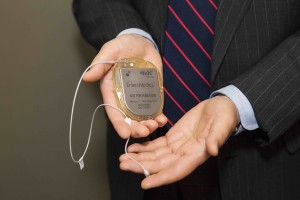Hunger blocker | by

New technology’s tiny electrical pulses signal weight loss for Sky Ridge patients
Ushering in “a new chapter” in weight-loss treatment, Sky Ridge Medical Center’s Bariatric Center of Excellence recently became the first in Colorado to offer patients a high-tech, alternative weight-loss option. Much like a pacemaker in a heart patient, the Maestro Rechargeable System, or VBLOC, uses minute electrical pulses to block the hunger messages that so-often sabotage weight-loss goals. Below, director Dr. Frank Chae talks more about this new technology.
How does the system work?
It’s the first advancement in weight-loss options in 10 years, and it doesn’t require major surgery or changes to the anatomy. The system is implanted laparoscopically just beneath the skin during an outpatient procedure. The system blocks signaling between the brain and the vagus nerve, which controls feelings of hunger and fullness.
Why would someone opt for VBLOC?
Recent studies have shown that the majority of people who use diet pills or weight-loss programs gain all of the weight back in three or four years. This is a wonderful option for those people who have failed with diet attempts but are not quite ready for surgery.
Will patients use it just until they reach their weight-loss goal?
This is actually designed for life-long use. It can be turned on or off externally. The frequency can be adjusted for changing needs, with no needles or surgery involved. We monitor patients every few months. We expect when people achieve the results they want that it will be used as a weight-maintenance tool.
Who qualifies for the procedure, and how effective is it?
The Food and Drug Administration approved VBLOC in January for patients 18 and older who have exhausted other diet weight-loss options and who have a body mass index of 35 to 45 with at least one other obesity-related condition, such as type 2 diabetes. The FDA study found better weight-loss results in a VBLOC group compared with a control group and noted sustained weight-loss in the VBLOC wearers 18 months out.
Does it ever need to be replaced?
Yes, in about seven to 10 years. Until then, it’s much like recharging an iPhone battery. Once or twice a week, patients just charge the device using external controllers.
Why did you decide to add VBLOC to your center’s options?
Two-thirds of American adults are now overweight, and excess weight can lead to stroke, heart disease, diabetes and some cancers. I would say less than 5 percent of the obese population would qualify for bariatric surgery. That leaves 95 percent of people who still need help. This is a new chapter in weight-loss options, an exciting technology that can make a big difference in many people’s lives. Plus this device helps patients address their weight issues without compromising their lifestyle or social well-being.
Dr. Chae is one of a select group of surgeons chosen to offer this procedure. In addition to VBLOC therapy, he also performs gastric bypass, plication, sleeve and banding procedures. Sky Ridge has been a Center of Excellence for Bariatric Surgery since 2006, and patients have collectively lost more than 75,000 pounds. For more information on this procedure, visit www.skyridgemedcenter.com.
Tags: obesity, Sky Ridge Medical Center, Sky Ridge Medical Center surgeons
Comments
Leave a Comment
Please be respectful while leaving comments. All comments are subject to removal by the moderator.


[…] devices is for weight loss. In January 2015, the FDA approved vagal blocking therapy, also known as vBloc, and Dr. Frank Chae, who specializes in weight loss therapy and surgery with the National Bariatric […]